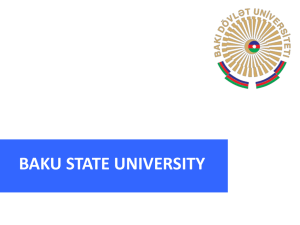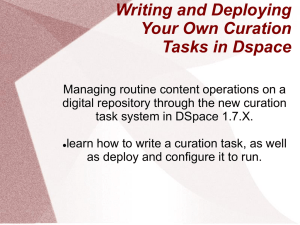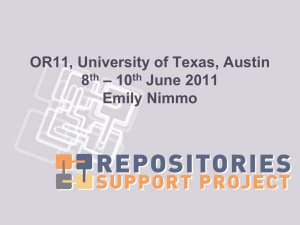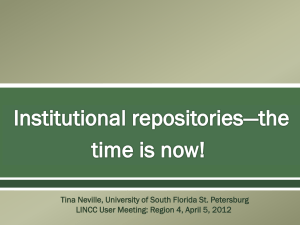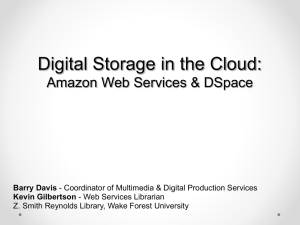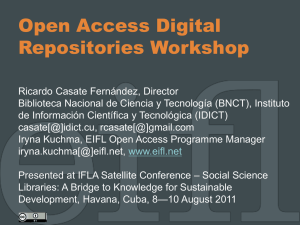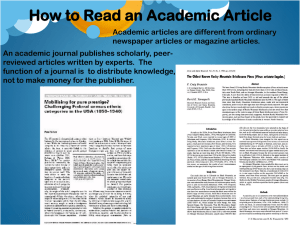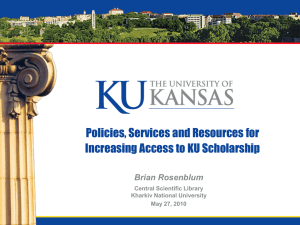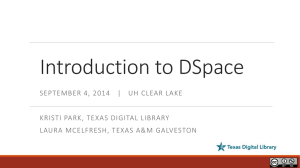IR_BHOS_31.03.2014 - BHOS Repository Home
advertisement
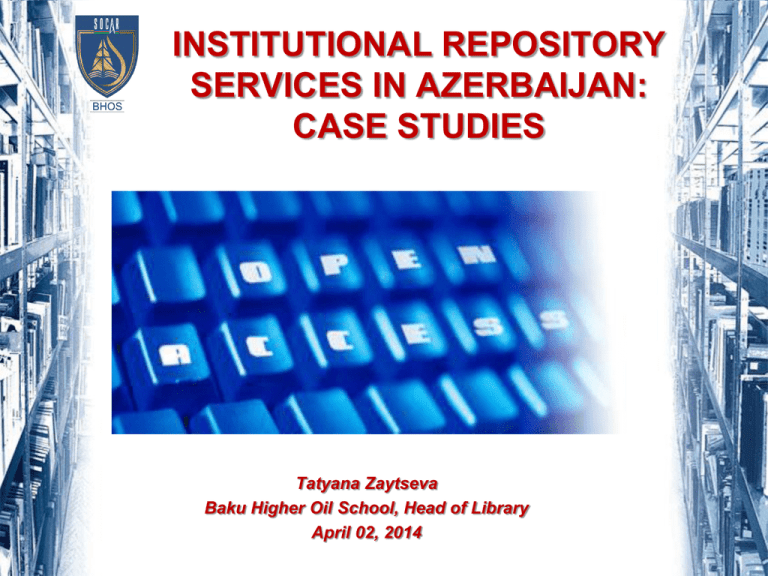
INSTITUTIONAL REPOSITORY SERVICES IN AZERBAIJAN: CASE STUDIES Tatyana Zaytseva Baku Higher Oil School, Head of Library April 02, 2014 Outline of Presentation Baku Higher Oil School at a Glance Introduction to Open Access and Institutional Repositories Institutional Repositories Development: World experience Institutional Repository Services by Dspace platform in Azerbaijan Baku Higher Oil School Library, April 02, 2014 2 Baku Higher Oil School . Baku Higher Oil School Library, April 02, 2014 3 Baku Higher Oil School at a Glance . Baku Higher Oil School (BHOS) (Azerbaijani; Bakı Ali Neft Məktəbi) was established as a subsidiary of SOCAR under the decree of the President of the Republic of Azerbaijan Ilham Aliyev dated 29 November 2011 Education process is based on strong partnership relations with Heriot-Watt University (HWU), UK The main language of instruction is English There are three specialties – Petroleum Engineering, Chemical Engineering, and Process Automation Engineering. Following the education results the students will get diplomas of BHOS and Heriot-Watt University BHOS students, professors and library have got access to all the HWU information resources, including VISION (Virtual Student Information Organisation Network) BHOS is the university many professors of which has got recognition and leadership in their professional fields Baku Higher Oil School Library, April 02, 2014 4 Definition of Open Access In using the term “open access”, we mean the free availability of peer-reviewed literature on the public internet, permitting any user to: - Read, - Download, - Copy, - Distribute, - Print, - Search, or Link to the full texts of the articles Baku Higher Oil School Library, April 02, 2014 5 Driving Force Behind Open Access – Dissatisfaction at all Levels Authors: their work is not seen by all their peers – do not receive the recognition they desire Readers: cannot view all research literature they need – less effective Libraries: cannot satisfy information needs of their users Baku Higher Oil School Library, April 02, 2014 6 The Open Access Movement BOAI, February 2002 Bethesda Statement on Open Access Publishing, 2003 Berlin Declaration, October 2003, May 2004 & February 2005 Welcome Trust, October 2003 Australian group of Eight Statement on Open Access to Scholarly Information, 2004 Alhambra Declaration on OA, May 2010 IFLA Statement on Open Access, April 2011 SPARC Europe Statement on Open Access, 2011 LERU Roadmap towards OA, June 2011 Baku Higher Oil School Library, April 02, 2014 7 Support of the Open Access by Developed Countries UK Parliamentary Inquiry: Science and Technology Committee, 2004 U.S. Appropriations Committee, 2004 Canada, 2003 - the Canadian Association of Research Libraries, launched an Institutional Repository Project in 2003 Australia, 2004 - Australian Research Information Infrastructure Committee (ARIIC) Open Access Declaration Italy, 2004 - Messina Declaration Germany, 2003 - Berlin Declaration on open Access to Knowledge in Sciences and Humanities Sweden- Since 2006, Sweden has had a national OA programme, OpenAccess.se, which has played a role in the creation of a national search portal for scholarly publications (SwePub) France - France's HAL multi-disciplinary open archive was launched by the Centre National de la Recherche Scientifique (CNRS) in 2001. Baku Higher Oil School Library, April 02, 2014 8 Support of the Open Access by EIFL Open Access policy has now been adopted by 47 institutions in developing and transition countries in the EIFL network There are 670+ open repositories and 3.400+ open access journals in EIFL partner countries EIFL- OA organized 121 awareness raising, advocacy and capacity building events and workshops in 2003-2013 in 41 countries with participants from over 50 countries Baku Higher Oil School Library, April 02, 2014 9 Support of the Open Access by Azerbaijan Baku Higher Oil School Library, April 02, 2014 10 Two Ways of the Open Access Budapest Open Access Initiative <http://www.soros.org/openaccess/index.shtml> Recommends 2 Strategies: 1. Open Access Journals ("gold"): Publish your article in a suitable open-access journal whenever one exists. 2. Self-archiving in Open Electronic Archives/Repositories ("green"): Otherwise, publish your article in a suitable toll-access journal and also self-archive it. Baku Higher Oil School Library, April 02, 2014 11 What is an Institutional Repository (IR)? “A digital collection capturing and preserving the intellectual output of a single or multi-university community.” Raym Crow. <http://www.arl.org/sparc/IR/ir.html> “A university-based institutional repository is a set of services that a university offers to the members of its community for the management and dissemination of digital materials created by the institution and its community members.” Clifford Lynch. Essential infrastructure for scholarship in the digital age ARL, no. 226 (February2003): 1-7. Baku Higher Oil School Library, April 02, 2014 12 Institutional Repositories’ Contributions to Open Access Scholarly communication Supporting education through learning materials Electronic publishing Managing digital collections of research outputs on university networks Housing and preserving digital collections Enhancing university’s prestige Baku Higher Oil School Library, April 02, 2014 13 Benefits of Institutional Repositories to Various Stakeholders For the researcher: Increased visibility of research output and consequently the department and the institution Potentially increased impact of publications as an author at the institution Provides the possibility to standardize institutional records e.g. academic's CVs and published papers Allows the creation of personalized publications lists Baku Higher Oil School Library, April 02, 2014 14 Benefits of Institutional Repositories to Various Stakeholders For the institution: Increases visibility and prestige of an institution Repository content is readily searchable both locally and globally A repository that contains high quality content could be used as a 'shop window' or marketing tool to entice staff, students and funding A repository can store other types of content that is not necessarily published, sometimes known as 'grey literature' Baku Higher Oil School Library, April 02, 2014 15 Benefits of Institutional Repositories to Various Stakeholders For the global community: Assists research collaboration through facilitating free exchange of scholarly information (this is enabled through the use of metadata harvesters of OAI-compliant institutional repositories) Aids in the public understanding of research endeavours and activities. Baku Higher Oil School Library, April 02, 2014 16 The Power of Open Access – Institutional Repositories For 72% of papers published in the Astrophysical Journal free versions of the paper are available in repositories (mainly through ArXiv) These 72% of papers are, on average, cited twice as often as the remaining 28% that do not have free versions available in repositories. Data «Greg Schwarz» Baku Higher Oil School Library, April 02, 2014 17 World-Wide Deployment 2604 Repositories Baku Higher Oil School Library, April 02, 2014 18 World-Wide Deployment by Countries Baku Higher Oil School Library, April 02, 2014 19 Former Soviet Union Countries Deployment Baku Higher Oil School Library, April 02, 2014 20 Registry of Open Access Repositories in Azerbaijan Baku Higher Oil School Library, April 02, 2014 21 Ranking Web of World Repositories: January, 2014 Presentation about Khazar University experience with DSpace is available at EIFL website: http://www.eifl.net/dspace Baku Higher Oil School Library, April 02, 2014 22 Registry of the BHOS Open Access Repository Baku Higher Oil School Library, April 02, 2014 23 Why have an IR at Baku Higher Oil School? To help the international Open Access efforts. “The mission of disseminating knowledge is only half complete if it is not widely and readily available to society.” (Adapted from the Berlin Declaration) <http://www.zim.mpg.de/openaccess-berlin/berlindeclaration.html To create a permanent record of the scholarly output of Baku Higher Oil School - No access to some scholarly works published by our own faculty - Collections of working papers, technical reports, research reports flowing around Baku Higher Oil School Library, April 02, 2014 24 Why Did We Choose DSpace? Top Reasons to use Dspace: Largest community of users and developers worldwide: over 1100 Khazar University Institutional Repository Successful story Any organization can use, modify, and even integrate the code into their commercial application without paying any licensing fees Well organized web-interface Metadata in Dublin core format Baku Higher Oil School Library, April 02, 2014 25 Where is DSpace available? http://dspace.bhos.edu.az/xmlui Baku Higher Oil School Library, April 02, 2014 26 Where is DSpace available? http://dspace.bhos.edu.az/xmlui 27 Communities and Collections Schools and Centers Chemical Engineering Department [70] Computer and Information - Communication Technologies Department [22] Electronic Training Department [19] English Language and Humanitarian Courses Center [15] International Relations Department [25] Library [135] Petroleum Engineering Department [26] Postgraduate Training Department [12] Public Relations Department [19] Quality Assurance Department [15] Other Collections Personal Pages [57] Learning Materials [81] 28 Collection Type and Size Communities 12 Collections 35 Books 141 Learning materials 81 Presentations 11 Personal Pages 57 Other 25 Baku Higher Oil School Library, April 02, 2014 29 Personal page Baku Higher Oil School Library, April 02, 2014 30 Personal page Baku Higher Oil School Library, April 02, 2014 31 Browsing by Author Baku Higher Oil School Library, April 02, 2014 32 Browsing by Subject Baku Higher Oil School Library, April 02, 2014 33 Browsing by Issue Data Baku Higher Oil School Library, April 02, 2014 34 Self-archiving Self-archiving serves two main purposes: Allows authors to disseminate their research articles for free over the internet Helps to ensure the preservation of those articles in a rapidly evolving electronic environment Baku Higher Oil School Library, April 02, 2014 35 Self-archiving To self-archive is to deposit a digital document in a publicly accessible website Depositing involves a simple web interface where the depositer copy/pastes in the “metadata” (date, author-name, title, journalname, etc.) and then attaches the full-text document Self-archiving takes only about 10 minutes DSpace also allows for documents to be selfarchived in bulk, rather than just one by one Many funding bodies mandate self-archiving Baku Higher Oil School Library, April 02, 2014 36 Self-archiving Submission an article to journal pre-print self-archiving Peer review Author revisions Submission of final version Article is published post-print Published version Baku Higher Oil School Library, April 02, 2014 37 Self-archiving by DSpace Register to: dspace.bhos.edu.az/xmlui Choose a collection you want to submit to, e.g. Personal Archive Send us an email and ask for registration rights. Baku Higher Oil School Library, April 02, 2014 38 Challenges Library will continue to: Provide support for university research self-archiving Educate users and faculty about the IR Showcase the IR Find champions and partners among faculty Seek institutional mandate and support Harvest documents Baku Higher Oil School Library, April 02, 2014 39 Conclusion This is the age of information explosion. It demands institutional Librarians to organize and provide right information to the right user at the right time. Baku Higher Oil School Library, April 02, 2014 40 Thank you for your attention! Tatyana Zayseva tatyana.zayseva@socar.az 41

